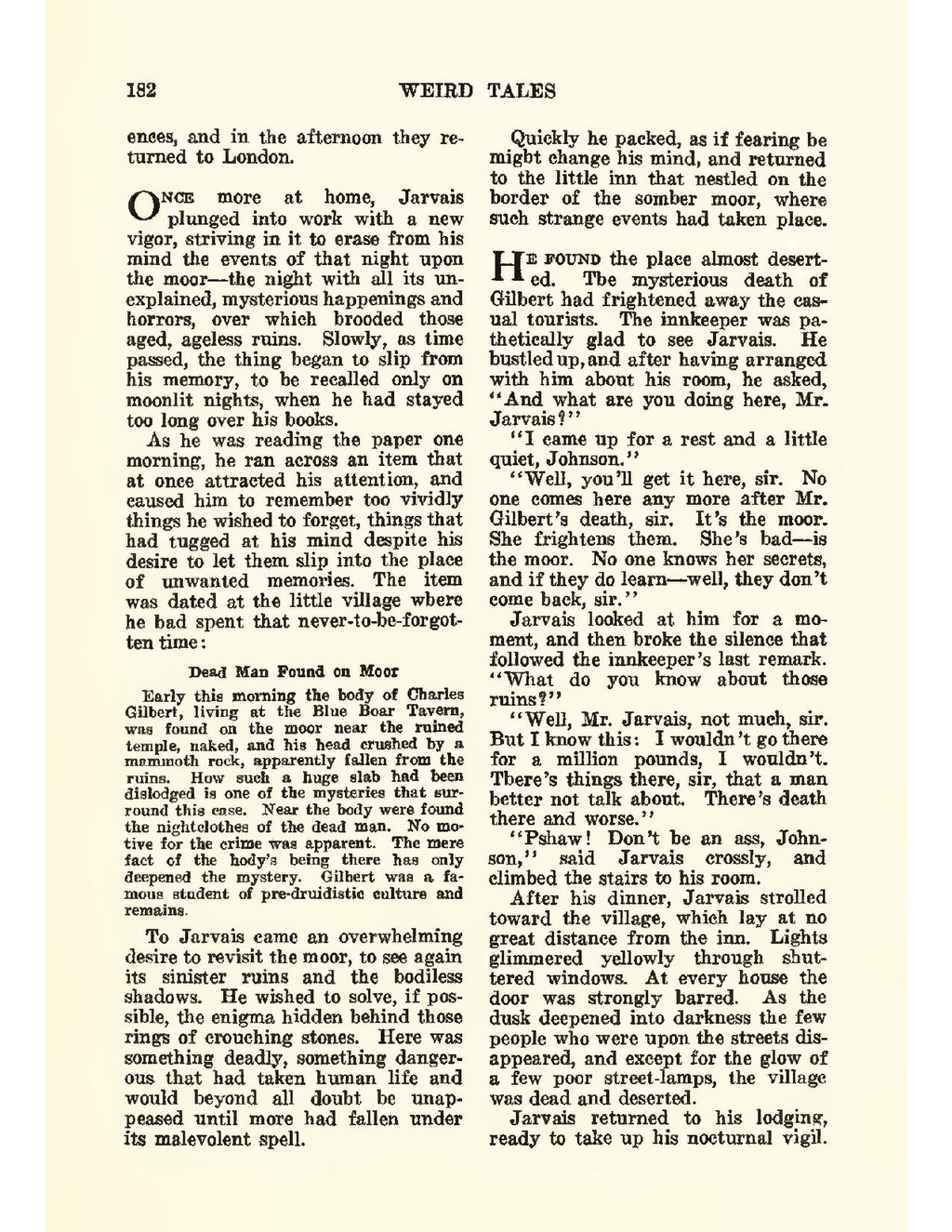ences, and in the afternoon they returned to London.
Once more at home, Jarvais plunged into work with a new vigor, striving in it to erase from his mind the events of that night upon the moor—the night with all its unexplained, mysterious happenings and horrors, over which brooded those aged, ageless ruins. Slowly, as time passed, the thing began to slip from his memory, to be recalled only on moonlit nights, when he had stayed too long over his books.
As he was reading the paper one morning, he ran across an item that at once attracted his attention, and caused him to remember too vividly things he wished to forget, things that had tugged at his mind despite his desire to let them slip into the place of unwanted memories. The item was dated at the little village where he had spent that never-to-be-forgotten time:
Dead Man Found on Moor
Early this morning the body of Charles Gilbert, living at the Blue Boar Tavern, was found on the moor near the ruined temple, naked, and his head crushed by a mammoth rock, apparently fallen from the ruins. How such a huge slab had been dislodged is one of the mysteries that surround this case. Near the body were found the nightclothes of the dead man. No motive for the crime was apparent. The mere fact of the body’s being there has only deepened the mystery. Gilbert was a famous student of pre-druidistic culture and remains.
To Jarvais came an overwhelming desire to revisit the moor, to see again its sinister ruins and the bodiless shadows. He wished to solve, if possible, the enigma hidden behind those rings of crouching stones. Here was something deadly, something dangerous that had taken human life and would beyond all doubt be unappeased until more had fallen under its malevolent spell.
Quickly he packed, as if fearing he might change his mind, and returned to the little inn that nestled on the border of the somber moor, where such strange events had taken place.
He found the place almost deserted. The mysterious death of Gilbert had frightened away the casual tourists. The innkeeper was pathetically glad to see Jarvais. He bustled up, and after having arranged with him about his room, he asked, “And what are you doing here, Mr. Jarvais?”
“I came up for a rest and a little quiet, Johnson.”
“Well, you’ll get it here, sir. No one comes here any more after Mr. Gilbert’s death, sir. It’s the moor. She frightens them. She’s bad—is the moor. No one knows her secrets, and if they do learn—well, they don’t come back, sir.”
Jarvais looked at him for a moment, and then broke the silence that followed the innkeeper’s last remark. “What do you know about those ruins?”
“Well, Mr. Jarvais, not much, sir. But I know this: I wouldn’t go there for a million pounds, I wouldn’t. There’s things there, sir, that a man better not talk about. There’s death there and worse.”
“Pshaw! Don’t be an ass, Johnson,” said Jarvais crossly, and climbed the stairs to his room.
After his dinner, Jarvais strolled toward the village, which lay at no great distance from the inn. Lights glimmered yellowly through shuttered windows. At every house the door was strongly barred. As the dusk deepened into darkness the few people who were upon the streets disappeared, and except for the glow of a few poor street-lamps, the village was dead and deserted.
Jarvais returned to his lodging, ready to take up his nocturnal vigil.
